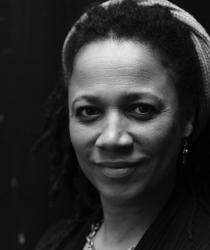
At least part of Nimmy March’s background is too well-known to need recounting in much depth here. The story of a girl of mixed race who was adopted and brought up by the Earl and Countess of March and Kinrara (later the Duke and Duchess of Richmond) is one that has continued to fascinate people in the decades since it first became a cause célèbre.
Nimmy’s adoptive parents were not the type to mollycoddle their daughter. At the age of eleven, she went to Bishop Luffa School, a local state comprehensive in Chichester, propelled by her parents’ insistence that a grounding in the real world would be better found there than at private school. It could have been a daunting prospect: “I was the only black kid in the school, an obvious target for the bullies at a time when Margaret Thatcher, as Leader of the Opposition, had made a pretty inflammatory speech about immigration, the National Front had got 6% of the vote in the most recent General Election and a lot of people just wanted to keep their heads below the parapet about the subject.”
From time to time, Nimmy found herself the target of the sort of bullying that is often reserved for people who appear to be different from their peers. Characteristically, she refused to allow these aggressors either to deter her or to define her: “One day I asked a particularly tall, obese tormentor why he was behaving like this when he, above all, should have understood the effect of bullying on other people,” she reflects. “Amazingly, he started to think, stopped doing it and instead became my friend and protector. My mother always used to remind me that bullying says far more about the bullies than their victims, which is quite right, of course, and my life has never been shaped by it in any way.”
I loved the variety so much that I didn’t want to go home at weekends
Back at home, Nimmy was beginning to hear stories about a school that appeared to be her idea of heaven. “My older sister had these three friends, the Verney girls, who had all been to Bedales,” she recalls. “I thought they were fantastic – warm, talented and creative people and I couldn’t get enough of their school tales. At the age of 13, I desperately wanted to go there but my parents preferred that I should spend a bit more time at Bishop Luffa. It wasn’t until I was sixteen that I went along to talk about history and English with Ruth Whiting and John Batstone. I remember the interviews so clearly but, although I must have written something as well, I have absolutely no memory of putting pen to paper at all!”
No matter – Nimmy was accepted by the school of her dreams. Even more delightfully, the reality of Bedales more than matched her expectations. “It was freedom with boundaries,” she begins. “I was welcomed unconditionally at once, adjusted to it immediately and felt as though I had come home. At my comprehensive, I’d been seen by some as a threat because I was different; at Bedales, I wasn’t different – everyone was. We had the most extraordinary cultural mix – Lebanese and Chinese, Maoris and Australians – and I’ve often thought that it was the best possible preparation for my later life in London.”
Throwing herself whole-heartedly into as many activities as possible, Nimmy sang in the chamber choir, played lacrosse, dabbled in art and outdoor work and revelled in drama under the tuition of Kate Slack. “I loved the variety so much that I didn’t want to go home at weekends,” she admits. A-Levels in History, English and Economics meant that much of Nimmy’s academic time would be spent watching John Batstone and Ruth Whiting at close quarters. “A fabulous experience to be taught by the pair of them,” she notes.
Although studying English at university might have seemed a natural choice on the face of it, Nimmy had also discovered at Bedales the possibilities that went along with acting: “I’d been mimicking a teacher; someone suggested that I have a go at an audition and I read for John Batstone’s production of The Schoolmistress, which I loved and was lucky enough to do with wonderful people like Phyllida Hancock, Jo Unwin, Shireen Wheeler and Polly Reeves. By the time I left Bedales, I was thinking that drama school would at least provide me with great preparation for life, even if it might not be a career and even though Kate Slack had warned me about how hard it might be, specifically as a woman and a black woman at that. Being someone else also struck me as easier than living my own life at times!”
Ever practical, Nimmy decided to take a year off after Bedales, initially to take a speed typing course and furnish herself with the additional string to her bow that all potential actors need, not to mention some extra cash: “After that, I went off to the States to see friends like Cathy Moherle, Ben Gooder and Tori Bridges, caught up with others in Italy and then returned to London for more secretarial work before going to Guildhall School of Music and Drama for three years.”
Nimmy’s choice had largely fallen on Guildhall because of its excellent reputation in two fields. “The music and singing was every bit as important to me as the drama,” she confirms. “Guildhall was a complete contrast to Bedales and I was now living a troglodyte existence in a windowless bedsit in Balham. However, Bedales had equipped me brilliantly to handle a new environment, forming friendships with people from different backgrounds and year groups had never been a big issue and that was crucial at a place with as much diversity as Guildhall.”
Bedalians are not typical people - they are supported in finding their confidence and are assured of their right to be who they want to be
Such an ability to mingle easily in any company would serve Nimmy well when she began her acting career in earnest with Theatre in Education Company, based at the Watford Palace Theatre. “I’d always thought that I understood conflicting worlds, that I had an idea of the perspectives of black and white, aristocrat and working class, and I wanted to bring people together as much as possible,” she says. “Theatre in Education had a socially and economically inclusive attitude but I almost didn’t get a job there because of my background; I was so naïve that it never occurred to me not to be honest about it. I knew about left-wing politics in theory but it was so thought-provoking and stimulating to see these politics being applied to the real world and to my profession. Casting across gender and race, for example, which was very common for us, was incredibly stimulating. Meanwhile, we were learning our trade by doing a lot of different stuff – devising our own shows and doing other people’s, often historically based ones.”
It was the start of a career that for a number of years blossomed both on stage and screen: “I loved theatre, which was what acting was really about for me at the beginning, particularly the way in which you can develop a character through exposure to different audiences and working as a team with other actors, and I would have been delighted to have ended up as an old theatrical crone,” Nimmy begins. “Having children was what made the big difference to the work that I could take on. It’s so difficult to get into a performance cycle because you end up by never seeing them. I realised that television would be what worked best for family life and I’ve been so lucky to be able to do so many different things over the years.”
Different indeed. From early roles such as Claudette, Delbert Wilkins’s girlfriend in The Lenny Henry Show, through staples such as Coronation Street, Goodnight Sweetheart, London’s Burning and Casualty to compelling performances in series such as Common as Muck, Undercover Heart, Strictly Confidential and 40, Nimmy has amassed a formidable back catalogue of television work. Beyond that and her family commitments, she adds variety by occasionally working as a life model and contributing to her local community as an adoption board member in Sussex. “The beauty of getting older is that you stop caring what people think and now that I’m almost 55, I care even less!” she chuckles. “One thing that I’m working on that really excites me is Different for Girls, which is a crowdfunded web drama series based on Jacquie Lawrence’s novel and depicts the lives of a vibrant mixed community in West London.”
It is a role for Nimmy that fulfils her desire to appear in more productions that better reflect the society in which we live. She is all too aware that the acting profession is one that can sometimes fall short of its diversity goals. “Acting is a tough enough gig anyway,” Nimmy begins. “To start with, governments don’t often recognise the value of the arts in the upkeep and reparation of the soul and as an actor you have to try to keep your fingers in as many pies as possible. So much talent gets overlooked and it is shocking that it remains where you come from or who you know that determines your progress as much as your talent. I didn’t choose acting as a career, things happened to fall my way and it chose me, so I’m not typical, but I would still say to people who are thinking of doing it to go for it. Just don’t put all your eggs in one basket.”
“Our profession can be so short-sighted,” Nimmy continues. “Non-Caucasian actors aren’t getting ahead often enough, nor are producers, directors or casting agents. There are so many of my contemporaries, people like David Harewood, Gary McDonald and Tony Armatrading, who have been forced to disappear to the States to make their mark because to be black and well-cast in the UK remains such a challenge. The pace of change is glacial here and I do wonder how we should get things moving. Positive discrimination can be so patronising to those that it’s designed to help but while the top of the food chain is still dominated by white, male decision-makers, what are we supposed to do about raising the profile of the rest of us? Do we march naked through Trafalgar Square?”
If this remains a particular bugbear for Nimmy, it is because of her own awareness of the opportunities that life has afforded her. Her spell at Bedales remains close to the top of her gratitude list. “It was only two years but what a crucial two years,” she says. “Bedalians are not typical people – they are supported in finding their confidence and are assured of their right to be who they want to be, without being cocky and without judging others and/or their choices. Confidence is everything; Bedales encouraged me to scuttle to the end of the branch before I had to jump off it, have a look down and then spread my wings. I never broke anything when I jumped and I have so much to thank Bedales for. When I went back for a recent reunion, it seemed only yesterday that I was a pupil and I was so pleased that I hadn’t romanticised my idea of the school. It was as I had remembered it and those memories are still as clear and as wonderful as ever.”
Nimmy March was interviewed by James Fairweather in December 2016
